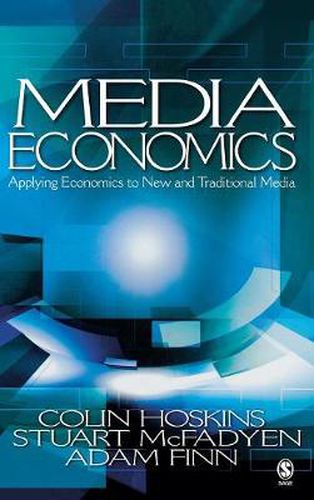Readings Newsletter
Become a Readings Member to make your shopping experience even easier.
Sign in or sign up for free!
You’re not far away from qualifying for FREE standard shipping within Australia
You’ve qualified for FREE standard shipping within Australia
The cart is loading…






How does the Internet affect the supply of information-based entertainment and cultural goods? Why do telephone companies have peak and off-peak prices for long-distance calls? Why is broadcasting - but not newspaper publishing - usually regulated and sometimes subsidized? Media Economics: Application of Economics to New and Traditional Media provides a thorough foundation of the microeconomic principles and concepts needed to understand media industries and issues in the converging media environment. Media Economics differs from ordinary media economic texts by taking a conceptual approach to economic issues.As the book progresses through economic principles, authors Colin Hoskins, Stuart McFadyen, and Adam Finn use cases and examples to demonstrate how these principles can be used to analyze media issues and problems.
Media Economics emphasizes economic concepts that have distinct application within media industries, including corporate media strategies and mergers, public policy within media industries, how industry structure and changing technologies affect the conduct and performance of media industries, and why the United States dominates trade in information and entertainment.This book features: chapter opening vignettes introduce the issues analyzed in each chapter; concise definitions of key terms for a clear understanding of basic microeconomic and managerial economic concepts; examples from media industries in a variety of countries including the United States, Canada, the United Kingdom, and Australia; a concept-driven approach enabling a longer shelf-life as technologies, structures, and revenues change; and a recognition of the reality of convergence and consolidation in media industries rather than addressing each media outlet individually. Media Economics assumes no prior background in economics and is designed for undergraduate and graduate students studying Media Economics and media industries. The book is an ideal text for public policy and the media or media and society courses with an economic perspective in Media Studies, Communication, Business, Journalism, Film Studies, Political Studies, and Economics programs.
$9.00 standard shipping within Australia
FREE standard shipping within Australia for orders over $100.00
Express & International shipping calculated at checkout
How does the Internet affect the supply of information-based entertainment and cultural goods? Why do telephone companies have peak and off-peak prices for long-distance calls? Why is broadcasting - but not newspaper publishing - usually regulated and sometimes subsidized? Media Economics: Application of Economics to New and Traditional Media provides a thorough foundation of the microeconomic principles and concepts needed to understand media industries and issues in the converging media environment. Media Economics differs from ordinary media economic texts by taking a conceptual approach to economic issues.As the book progresses through economic principles, authors Colin Hoskins, Stuart McFadyen, and Adam Finn use cases and examples to demonstrate how these principles can be used to analyze media issues and problems.
Media Economics emphasizes economic concepts that have distinct application within media industries, including corporate media strategies and mergers, public policy within media industries, how industry structure and changing technologies affect the conduct and performance of media industries, and why the United States dominates trade in information and entertainment.This book features: chapter opening vignettes introduce the issues analyzed in each chapter; concise definitions of key terms for a clear understanding of basic microeconomic and managerial economic concepts; examples from media industries in a variety of countries including the United States, Canada, the United Kingdom, and Australia; a concept-driven approach enabling a longer shelf-life as technologies, structures, and revenues change; and a recognition of the reality of convergence and consolidation in media industries rather than addressing each media outlet individually. Media Economics assumes no prior background in economics and is designed for undergraduate and graduate students studying Media Economics and media industries. The book is an ideal text for public policy and the media or media and society courses with an economic perspective in Media Studies, Communication, Business, Journalism, Film Studies, Political Studies, and Economics programs.